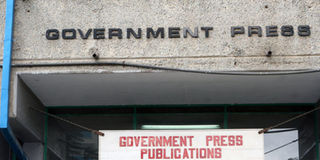Proposed law: Probe on illegal edit stalls

Sources at Government Press said printing was initially stopped twice, which appears to have prepared the ground for the insertions. Photo/WILLIAM OERI
The fate of a high-level police investigation into the illegal insertion of two words with serious implications on civil liberties into Kenya's proposed constitution appears to be in the balance. One week after a deadline passed for the detectives to finalise investigations and hand their report to Police Commissioner Mathew Iteere, there has been no word on the findings.
The Daily Nation — which first broke the story of the illegal insertion of the words “National Security” as grounds for limitations on the Bill of Rights just before Attorney-General Amos Wako published the proposed constitution — has now learnt that the investigations team, headed by a senior CID officer had made very little progress and had recorded statements only from a few junior workers at the Government Press.
The Nation learnt from a senior police officer who requested anonymity, that the investigations team headed by Mr Gideon Kimilu had been given an extra month to complete its work. But some officers doubted that it would accomplish much especially as, they claimed, it was largely a one-man operation, rather than a top level team of fraud and cyber-crime investigators as initially announced.
Those familiar with the investigations said that Attorney-General Amos Wako, who directed the police commissioner to institute investigations, had not recorded a statement. Neither have senior officials in his office, who had access to the document before it was transmitted to the Government Printer.
Also spared the attention of investigators are senior staff at the Government Press, and those of National Security Intelligence Service, the unit alleged by Mr Wako to have unsuccessfully requested the amendments that finally appeared in an earlier printed version, and their senior at the Office of the President, Ministry of Internal Security.
There have since been reports that the investigation had been quietly called off. But contacted by the Nation, police spokesman Eric Kiraithe denied that the investigators had been recalled. He said the investigation was “a very complex matter” that would take more time than initially envisaged, adding. “We’re not going to discuss an ongoing investigation... it jeopardises a case and it’s unethical.”
Mr Kiraithe dismissed suggestions that the investigation was set up as a public relations gimmick. “The directive to commence investigations was given by the constitutional authority of the Attorney-General and thus cannot be disregarded,” he said. However, Mr Hassan Omar of the Kenya National Commission on Human Rights insisted that the police commissioner had an obligation to update the public on progress with the investigations.
“There is speculation going on that people in high places were involved in introducing the words ‘national security’ into the draft constitution and that is why the police commissioner should live to his public declaration that he was going to carry out comprehensive investigations and prosecute those involved,” he said.
Mr Omar said the illegal introduction of the two words in the proposed constitution and Tuesday’s constitutional court ruling against the kadhi courts were raising fears that some powerful forces were out to derail the constitutional review process.
The words were introduced in Article 24 (1) (d) in the chapter on the Bill of Rights. The correct version reads: “The need to ensure that the enjoyment of rights and fundamental freedoms by any individual does not prejudice the rights and fundamental freedoms of others.”
The illegal version read: “The need to ensure that the enjoyment of rights and fundamental freedoms by any individual does not prejudice national security, the rights and fundamental freedoms of others.” The investigation was centred around the State Law office, headed by Mr Wako, where the draft was published and the Government Press, where it was printed.
Investigations by the Nation revealed that a line on a page was replaced with one containing the names “national security” onto the original works as films were taken in readiness for plate-making. The people who ordered the changes remain unknown. Sources at Government Press said printing was initially stopped twice, which appears to have prepared the ground for the insertions.
The first printing of about 20,000 copies was stopped on the grounds that it had been done on white A4 size paper. Such printing is usually meant for official reports such as those of commissions of inquiry. The second printing of an estimated 20,000 copies was also stopped because it was printed on blue A4 size paper, which is meant for Bills and circulars.
It was argued that unlike the 2005 referendum document, which could have been returned to Parliament if it was approved, the current one will become law if passed on August 4. It was therefore to be printed in the current format on white A5 size paper. Sources that cannot be named because of the sensitivity of the matter said the change was made in such a hurry that it was not taken back for proofreading as should have been the case.




